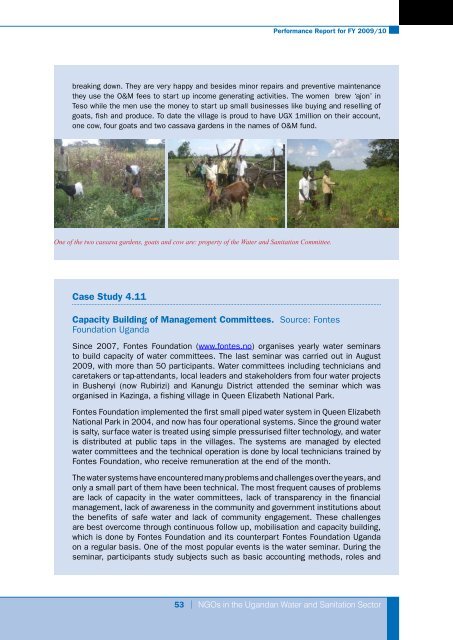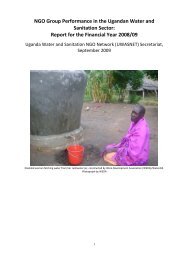Performance Report for FY 2009/10 - UWASNET
Performance Report for FY 2009/10 - UWASNET
Performance Report for FY 2009/10 - UWASNET
You also want an ePaper? Increase the reach of your titles
YUMPU automatically turns print PDFs into web optimized ePapers that Google loves.
<strong>Per<strong>for</strong>mance</strong> <strong>Report</strong> <strong>for</strong> <strong>FY</strong> <strong>2009</strong>/<strong>10</strong><br />
breaking down. They are very happy and besides minor repairs and preventive maintenance<br />
they use the O&M fees to start up income generating activities. The women brew ‘ajon’ in<br />
Teso while the men use the money to start up small businesses like buying and reselling of<br />
goats, fish and produce. To date the village is proud to have UGX 1million on their account,<br />
one cow, four goats and two cassava gardens in the names of O&M fund.<br />
One of the two cassava gardens, goats and cow are: property of the Water and Sanitation Committee.<br />
Case Study 4.11<br />
Capacity Building of Management Committees. Source: Fontes<br />
Foundation Uganda<br />
Since 2007, Fontes Foundation (www.fontes.no) organises yearly water seminars<br />
to build capacity of water committees. The last seminar was carried out in August<br />
<strong>2009</strong>, with more than 50 participants. Water committees including technicians and<br />
caretakers or tap-attendants, local leaders and stakeholders from four water projects<br />
in Bushenyi (now Rubirizi) and Kanungu District attended the seminar which was<br />
organised in Kazinga, a fishing village in Queen Elizabeth National Park.<br />
Fontes Foundation implemented the first small piped water system in Queen Elizabeth<br />
National Park in 2004, and now has four operational systems. Since the ground water<br />
is salty, surface water is treated using simple pressurised filter technology, and water<br />
is distributed at public taps in the villages. The systems are managed by elected<br />
water committees and the technical operation is done by local technicians trained by<br />
Fontes Foundation, who receive remuneration at the end of the month.<br />
The water systems have encountered many problems and challenges over the years, and<br />
only a small part of them have been technical. The most frequent causes of problems<br />
are lack of capacity in the water committees, lack of transparency in the financial<br />
management, lack of awareness in the community and government institutions about<br />
the benefits of safe water and lack of community engagement. These challenges<br />
are best overcome through continuous follow up, mobilisation and capacity building,<br />
which is done by Fontes Foundation and its counterpart Fontes Foundation Uganda<br />
on a regular basis. One of the most popular events is the water seminar. During the<br />
seminar, participants study subjects such as basic accounting methods, roles and<br />
53 | NGOs in the Ugandan Water and Sanitation Sector



